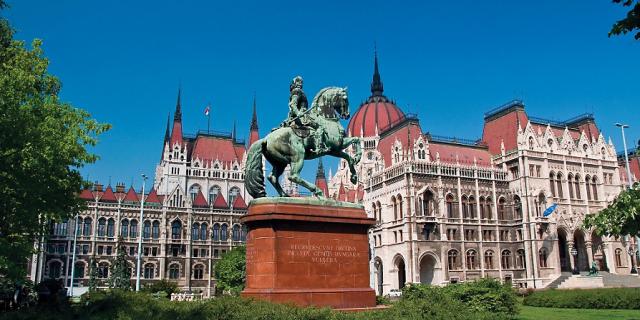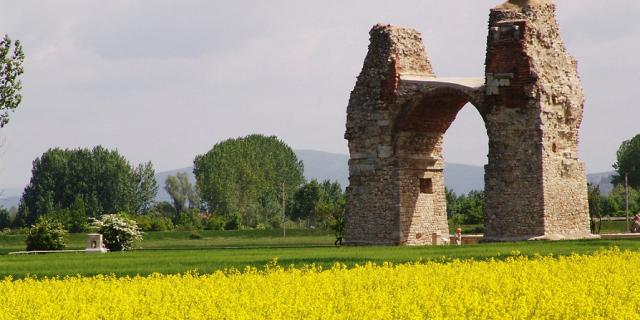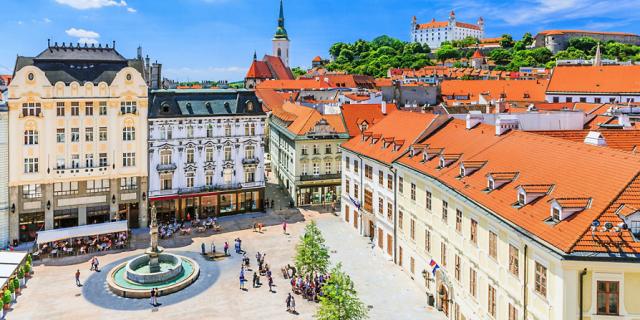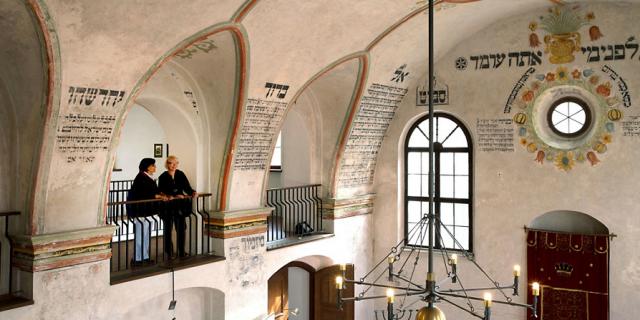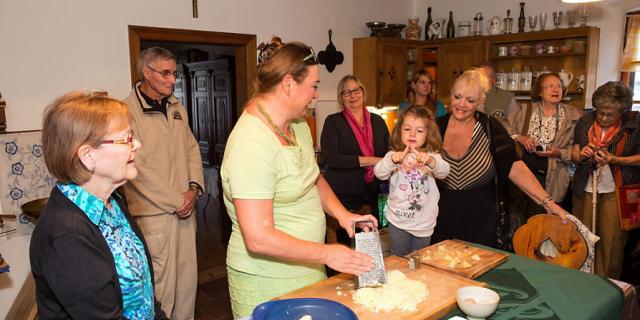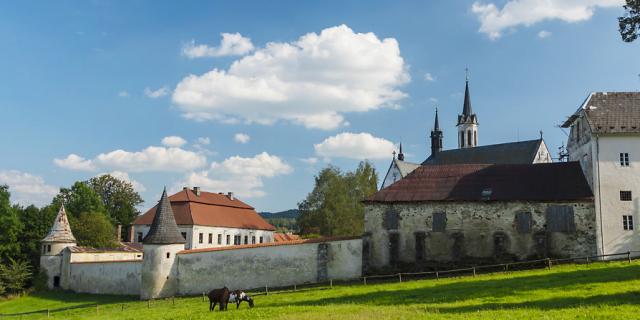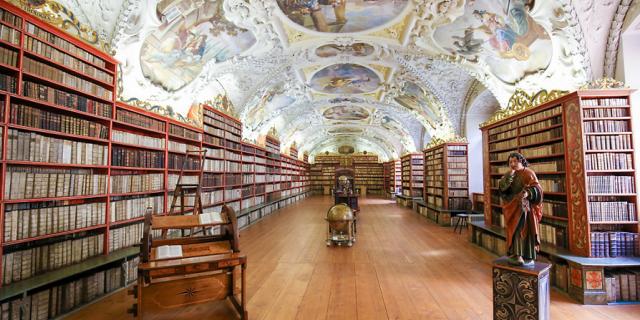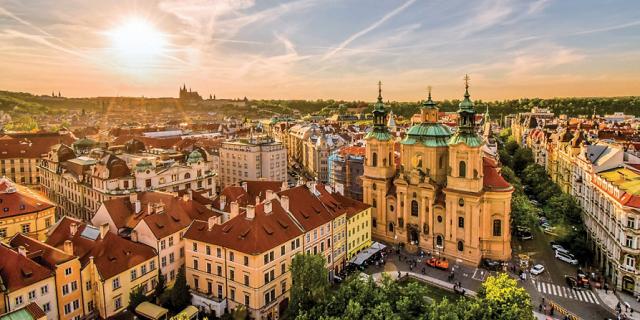- Explore in a small group of 8-16 travelers (average group size of 13)
- All land transportation
- Accommodations for 13 nights
- 30 meals—13 breakfasts, 9 lunches, and 8 dinners (including 1 Home-Hosted Dinner)
- 21 small group activities
- Services of a local O.A.T. Trip Experience Leader
- Gratuities for local guides, drivers, and luggage porters
- 5% Frequent Traveler Credit toward your next adventure
Please note:
Deposit requirement on land trips is $350
Past traveler savings of 5% if you traveled from 2018 onward
New travelers get $100 savings
Journey with O.A.T. into Eastern Europe’s Bohemian heartland to discover the history, culture, and landscapes of the Czech Republic, Slovakia, and Hungary—and prepare to enter an enchanting world of fairy-tale castles, Gothic cathedrals, and picturesque towns. In the Czech Republic, a region noted for its hearty Bohemian beers, witness the spires of Prague, the medieval splendor of Cesky Krumlov, and traditional ways of life in the Renaissance village of Slavonice. In Slovakia, discover the youthful optimism of Bratislava, the forested country’s historic capital. Then, enjoy an audience with the “Queen of the Danube,” and immerse yourself in the grandeur of Budapest, the lovely Hungarian capital infused with the vibrancy of a fiery paprika. And because we travel in such a small group with a local Trip Experience Leader by our side, we'll be able to delve deeply into Bohemian culture through interactions with the warm and friendly inhabitants of three of Eastern Europe’s cultural gems.
And whenever you’d like, you have the freedom to explore more of the Czech Republic, Slovakia, and Hungary on your own: Break off from the group for independent discoveries—like like strolling the Botanical Garden in Prague or visiting St. Stephen's Basilica in Budapest—during free time.
DAY 1
Fly to Prague, Czech Republic
Depart the U.S. today on your overnight flight to Prague, Czech Republic.
DAY 2
Arrive Prague, Czech Republic
Destinations: Prague, Czech Republic
Accommodations: Le Palais Art Hotel or similar
Afternoon: Depending on what time you arrive in Prague, an O.A.T. representative will meet you at the airport and assist you to your centrally-located hotel, about a 45-minute drive. Hotel amenities may include a bar, bistro, and fitness center depending on where you stay. Typical rooms come with air-conditioning, satellite TV, safe, minibar, wireless Internet access, and private bath with hair dryer.
You'll get to know your Trip Experience Leader and small group, including those arriving from one of our two pre-trip extensions: Berlin, Wittenberg, Dresden & the Elbe River Valley or New! Poland: Krakow, Auschwitz & Warsaw, at 6pm during a short orientation walk around the neighborhood.
Dinner: On your own after your orientation walk. Perhaps you'll enjoy dinner at one of the many restaurants nearby or at the hotel's on-site bistro.
Evening: The reminder of the day is free for you to explore the area or settle into your room.
DAY 3
Explore Prague
Destination: Prague
Meals included: B L D
Accommodations: Le Palais Art Hotel or similar
Breakfast: Served at the hotel beginning at 7am, featuring Czech and American dishes.
Morning: Our Trip Experience Leader will lead a Welcome Briefing this morning around 8am, when we will introduce ourselves and review our itinerary in more detail (including any changes that may need to occur). Our Trip Experience Leader will also discuss logistics, safety and emergency procedures, answer questions we may have, as well as introduce any optional tours available.
We'll then begin our Czech Republic travel experiences with a guided walking tour of Prague with a local guide, departing the hotel early at 9am to avoid the crowds at key sites. Nestled in a bend of the Vltava River, Prague's spires have endured to create one of Europe's most recognizable skylines. While other European capitals were leveled during World War II, Prague survived virtually intact. We'll witness a few of its enduring landmarks during our tour, but we'll also head down less-visited side streets—and tuck into a family-owned café for a brief coffee break—to get a better sense of the pace of life in Prague for everyday residents.
Lunch: At a local restaurant featuring Czech cuisine after concluding our tour around 1pm.
Afternoon: Around 2:30pm, you're free to make your own discoveries. Perhaps you'll visit Josefov (Prague's Jewish Quarter). The Prague Ghetto and vibrant Jewish community have contributed to Prague's character since the tenth century. Around 6:30pm, we'll reconvene at the hotel and walk about 5 minutes to a local restaurant.
Dinner: Around 6:30pm at a local restaurant to enjoy a Welcome Dinner featuring locally-inspired dishes. You'll get to know your fellow travelers and we'll toast to the adventures ahead.
Evening: You have the freedom to spend the rest of your evening as you wish. Perhaps you'll take an evening stroll in town or enjoy a Czech Pilsner at a local bar.
DAY 4
Explore Prague • Controversial Topic: The ideals of the Velvet Revolution versus today's conservative Czech politics with Zdenek Vacek
Destination: Prague
Meals included: B
Accommodations: Le Palais Art Hotel or similar
Exclusive O.A.T. Activity: Today's discoveries will feature a Controversial Topic: We'll meet with a local professor to talk about the the Velvet Revolution, learning about his firsthand experience of life under Communism and how modern-day Czechs are divided about their attitude toward the post-Communist government and current administration. Read more about this conversation below.
Breakfast: Served at the hotel beginning at 7am, featuring Czech and American dishes.
Morning: We'll board our bus around 8:30am and drive roughly 30 minutes to our first destination of the day: Strahov Monastery. Founded in 1140, this sprawling complex sits high atop Petrin Hill on the opposite side from Prague Castle. Offering visitors the same sweeping views of the city below as Prague Castle does—but without the crowds—the monastery also boasts an impressive church, a library containing a number of rare medieval manuscripts, maps, and globes, and one of the best collections of Gothic, Baroque, and Rococo paintings in central Europe.
Then around 10:30am, we’ll walk to a local café to meet with Zdenek Vacek, a local professor and lifelong Prague resident who will speak with us about a Controversial Topic: The end of Communism in 1989, and how modern-day Czechs are divided about their attitude toward the post-Communist government and current administration.
Mr. Vacek was born in Prague and grew up beneath the boot of the Communist regime. When he was six years old, his father was taken from his home and detained by Communist police, who had come to nationalize his business. During the Prague Spring of 1968, he dodged bullets fired by Soviet soldiers who had come to crack down on liberal reforms. Then in 1989, Mr. Vacek joined hundreds of thousands in Wenceslas Square—including his own students—during the Velvet Revolution, the nonviolent movement which finally led to the downfall of Czechoslovakia’s Communist government. The café where we have met Mr. Vacek is situated in the same location where this famed revolution took place.
While the end of Czech Communism was a cause for celebration for him and his compatriots, the years since have been anything but harmonious. Although liberals and intellectuals in Prague and other urban centers looked forward to a new age of democracy and enlightenment, many Czechs who live outside of the cities in rural areas feel that the post-Communist reforms have left them behind and believe they lack meaningful representation in the national government. The country’s decision to join the European Union in 2004 has been especially contentious, with some believing that their economic interests and national identity have been threatened. We’ll hear more about this side of the issue on Day 6 from the point of view of a local from Cesky Krumlov.
Today, the modern Czech Republic is a divided nation, and its scandal-plagued president, Miloš Zeman, sits at the center of the controversy. Zeman participated in the Velvet Revolution and was elected to office in 2013—the first Czech president to be directly elected by the people instead of the parliament. Zeman, however, quickly courted controversy with many liberals—Mr. Vacek among them—accusing him of abandoning the democratic principles that drove the revolution, and instead adopting a populist agenda aimed at courting disaffected rural citizens, and favoring strong relationships with foreign authoritarian governments such as Russia and China. Zeman was then narrowly re-elected in 2018 against a liberal candidate, Jiří Drahoš, a chemist and former head of the Czech academy of sciences, by a thin but decisive margin of 51.5% to 48.5%. His re-election marked a victory for anti-immigrant, far-right forces in Czech Republic, and tilted its politics in an anti-western direction.
Zeman and his current prime minister—Andrej Babiš, a former Communist Party member, and modern-day billionaire that owns the state-run print media—are frequent targets of mass protest. Notably, in 2014, on the 25th anniversary of the Velvet Revolution, a crowd of thousands greeted Zeman in Prague with angry chants of “resign, resign,” going so far as to pelt him with eggs and other objects. Many believe that the pair of leaders threatens to undo the progress made toward democracy and human rights in the 30 years since the revolution, ushering in a dark age of oligarchy—or worse, a return to Communist rule.
We’ll learn more about this controversy, availing ourselves of the unique perspective offered by Mr. Vacek—an opportunity exclusively available through O.A.T.’s local connections in the region. We’ll listen to his stories of life before the Velvet Revolution, and how he feels betrayed by President Zeman who once joined him in his fight for liberty and democracy. Our conversation with Mr. Vacek will last around an hour, with 30 minutes to ask questions and gauge your own opinion. Our Trip Experience Leader will be ready to help facilitate the conversation. As you continue your journey through Czech Republic, be sure to pay attention to local people and ask questions as you travel between city and country, judging for yourself how opinions are split.
We conclude our conversation at around 11:30am, then walk to visit Mala Strana, which translates to "the lesser side." Our Trip Experience Leader will introduce us to this area as we explore its streets. Mala Strana is linked to Prague's Old Town (Stare Mesto) by the Charles Bridge. Originally an eighth-century market town, today Mala Strana is a neighborhood of cobbled streets, boutiques, and Baroque churches and palaces. As you explore with your Trip Experience Leader, you'll witness the iconic John Lennon wall and stroll along the tree-lined lanes of Kampa Park.
Lunch: On your own starting around 1:00pm. Perhaps you'll choose to dine at the Kampa Park Restaurant, which overlooks the Charles Bridge.
Afternoon: Free time continues into the afternoon.
Dinner: On your own. Perhaps you'll try vepřo-knedlo-zelo, a local specialty made of bread dumplings, roast pork, and stewed cabbage.
Evening: You have the freedom to spend the rest of your evening as you wish, making any final discoveries during your last night in Prague.
DAY 5
Travel to Cesky Krumlov • Visit Vojna Memorial
Destination: Cesky Krumlov
Meals included: B L D
Accommodations: Hotel Ebersbach or similar
Activity Note: Today's transfer to Cesky Krumlov will be about 4 hours long, broken up by intermittent stops.
Breakfast: Served at the hotel beginning at 7am, featuring Czech and American dishes.
Morning: We board our bus around 9:30am and begin our overland journey to Cesky Krumlov, stopping around 10:15am to visit the Vojna Memorial. Located in the middle of a forest, Vojna was originally built by German prisoners of war after World War II as a labor camp to work in the nearby uranium mines. With the Communist takeover in 1948, Vojna transitioned into a notorious forced labor camp for political prisoners. Today, the Vojna Memorial is a powerful reminder of the many Czech victims of the Communist regime.
Around 11:30am, we'll drive about 1.5 hours and stop in Pisek, a picturesque Bohemian town founded in the 13th century on the banks of the Otava River.
Lunch: At a local restaurant in Pisek around 1pm, featuring Central European cuisine.
Afternoon: We'll depart Pisek around 3pm and drive roughly 1.5 hours to Cesky Krumlov. Upon arrival around 4:30pm, we'll check in to our hotel. Depending on which hotel you stay in, it may feature massage facilities or a restaurant. Typical rooms offer satellite TV, minibar, safe, wireless Internet, and private bath with hair dryer. In order to preserve the integrity of the original building, air conditioning is not possible in the rooms.
Later this afternoon, join your Trip Experience Leader on an orientation walk to get acquainted with the vicinity around your hotel. The walk will conclude around 6:30pm at a local restaurant.
Dinner: At a local restaurant around 6:30pm, including locally-inspired Czech dishes.
Evening: You have the freedom to spend the rest of your evening as you wish.
DAY 6
Explore Cesky Krumlov • Rafting on Vltava River • Home-Hosted Dinner
Destination: Cesky Krumlov
Meals included: B D
Accommodations: Hotel Ebersbach or similar
Exclusive O.A.T. Activity: Today's discoveries will feature a Home-Hosted Dinner with a local Czech family. Expect simple, hearty fare as you enjoy this unique opportunity to experience a slice of everyday life in Cesky Krumlov. Read on below to learn more about this experience.
Activity Note: Early spring and fall departures may not offer the rafting excursion, and adverse weather conditions may preclude rafting at any time of year.
Breakfast: Served at the hotel beginning at 7am, featuring Czech and American dishes.
Morning: Around 9:45am, we'll witness the Cesky Krumlov of today when we join a local guide on a walking tour. Nestled inside a narrow loop of the Vltava River, this romantic town with its hilltop castle was once a wealthy trading center and a favorite of European nobility. Today, its confection of red-gabled roofs, elegant bridges, and storybook castle lures lovers of history, culture, and architecture alike. Established in 1250 by the Lords of Krumlov, the 14th through 16th centuries brought a period of great splendor to Cesky Krumlov, which became a stop along one of the main trading routes to Italy. We'll walk the winding, cobbled streets to admire the splendidly preserved historic buildings of the medieval town, a UNESCO World Heritage Site, and ascend to the top of the hill to stroll through the courtyards and gardens of Cesky Krumlov Castle, a Renaissance jewel that encompasses more than 40 buildings, a castle brewery—and live bears who roam the castle's moat. We'll also visit the recently opened Castle Museum, which features precious artifacts previously hidden in castle depositories. After our visit, around 12:15pm, we'll walk down from the castle back to town.
Lunch: On your own around noon. Perhaps you'll trysvíčková, a meat dish with sirloin steak, vegetables, and a thick cream sauce.
Afternoon: We’ll have some free time to make our own discoveries before we walk to a peaceful rafting excursion through the historical heart of Cesky Krumlov around 3pm, discovering this city from a different perspective. We'll paddle about three miles on the gentle waters of the undulating Vltava River, with six travelers and an instructor in each raft. This 1.5-hour-long trip is easy enough for the novice but passes through parts of the city that will charm the more experienced rafters as well. Following our rafting adventure, you'll have some free time to relax before dinner.
Dinner: Around 6pm, we'll drive approximately 30 minutes to tonight's special dinner location—in the the home of a local Czech family to enjoy a Home-Hosted Dinner.
In an even smaller group of no more than 5 people, you'll enjoy a taste of Czech culture and engage in lively conversation over a dinner of freshly-prepared, home-cooked dishes. Some traditional favorites you may enjoy would be rajska, a traditional creamy tomato sauce served over bread dumplings and boiled beef, or knedlo vepro zelo—roasted pork with dumplings and sauerkraut.
This experience offers us a rare opportunity to connect with local culture on a more intimate level: In our hosts’ homes, we’ll see the family go about their evening routine and witness what life is like in this small town in South Bohemia. As you get to know your hosts, take the time to ask questions and get a better sense of not just local Czech culture, but also family dynamics and culinary traditions.
Evening: We'll arrive back at the hotel around 8:30pm tonight. You have the freedom to spend the rest of your evening as you wish.
DAY 7
Explore Vyssi Brod Monastery • A conversation about restitution and property rights in Studetenlands • Treetop hike at Lipno Lake
Destination: Cesky Krumlov
Meals included: B L
Accommodations: Hotel Ebersbach or similar
Breakfast: Served at the hotel beginning at 7am, featuring Czech and American dishes.
Morning: We'll gather in a meeting room in our hotel around 8am to meet Oli, a local from Cesky Krumlov, and engage in a conversation about the controversy surrounding the Sudetenland region in western Czech Republic.
Following World War II, thousands of ethnic Germans were expelled from this region. The expulsion was a direct result of the German occupation of Czech Republic (then known as Czechoslovakia), beginning in 1938 and remaining throughout the war. Czech resistance groups demanded the deportation of ethnic Germans from their country and sought the Allied Nations’ support. In the months following the end of World War II, Czech president Edvard Beneš gave his support of this idea as well, calling it the “final solution of the German question."
However, the end of the war also brought about widespread chaos—central governments were unstable and it was difficult to carry out the deportations with any formal process. Many expulsions were carried out by local authorities, mostly consisting of armed volunteers. Several thousand Sudeten Germans died during the expulsion—some violently, others succumbing to hunger and illness.
In the deportation order’s original plan, only a few hundred thousand Sudeten Germans were to be affected, individuals that had been disloyal to Czechoslovakia and had acted as Hitler's "fifth column" during the occupation. Yet as the Nazi atrocities in occupied Czechoslovakia escalated, Czech resistance groups—as well as a majority of the Czech population—called for the deportation of even more Germans, regardless of whether there had been an investigation or even an inference of guilt. In the end, around 1.6 million Sudeten Germans were deported to West Germany while another estimated 800,000 were sent to Soviet-controlled East Germany.
Oli’s family experienced this expulsion firsthand: Her grandfather’s fiancée, pregnant with their child, was deported from Cesky Krumlov because she was Sudeten German. Her family’s home was then given to a Czech family. She gave birth in West Germany—then known as the American zone—but in the interim, Czech Republic had fallen under Communist rule. It was therefore many years before Oli’s family was able to be reunited. This is a tragic tale, but sadly one of many, and we will learn from her how this experience remains a bitter subject in areas of Czech Republic that used to be Sudetenland, like Cesky Krumlov.
Since the collapse of Communism, however, Sudeten German representatives in Bavaria have been pressing the Czech Republic for the return of properties that families had been stripped of during the expulsion. Other Sudeten Germans merely seek reconciliation with the country their families once called home. Over 75 years later, the scars of this period time have yet to heal, with Czechs falling on either side of the issue. During our 1-hour conversation with Oli, we’ll listen to her story and have plenty of time to ask our own questions. Opportunities to meet with locals and learn about the issues affecting them can occasionally be emotional and challenging—but we believe they are the best way to really get to know the heart of a destination.
Then around 9am, we'll board our bus and drive 45 minutes outside Cesky Krumlov and your Trip Experience Leader will guide a tour of Vyssi Brod Monastery, a Cistercian monastery with roots that stretch back to the middle of the 13th century. Considered the spiritual center of South Bohemia, the monastery also features a richly decorated library that dates back to the Baroque period. At the onset of World War II, the religious order lost control of the monastery—first to the Nazis, and then to the Soviets. Following the Velvet Revolution, the monastery was returned to the monks, who have begun restoring it to its former glory. Our tour concludes around 11:30am and we’ll then drive about 30 minutes to the small town of Rozmberk nad Vltavou.
Lunch: At a local restaurant in Rozmberk nad Vltavou around 12pm featuring typical Czech cuisine.
Afternoon: Following lunch, we'll drive roughly 40 minutes to Lipno Lake, a body of water created by damming the Vltava River. Here, we'll enjoy a "treetop hike" along a long wooden walkway for views of the surrounding Sumava countryside, the massive lake, and the distant Alps. After our hike around 3:45pm, we'll depart for Cesky Krumlov, arriving around 4:45pm.
Dinner: On your own. The town hosts a variety of restaurant options including medieval taverns, a barbecue cellar, and even an Italian pizzeria.
Evening: You have the freedom to spend the rest of your evening as you wish. Perhaps you'll take one last stroll through town or rest up for tomorrow's transfer to Slavonice.
DAY 8
Budvar Brewery in Ceske Budejovice • Explore Trebon • Slavonice
Destination: Slavonice
Meals included: B L D
Accommodations: Hotel Dom u Ruze or similar
Activity Note: Today's transfer to Slavonice will be about 3 hours long, with stops along the way.
Breakfast: Served at the hotel beginning at 7am, featuring Czech and American dishes.
Morning: We depart Cesky Krumlov by bus around 8:15am for an overland journey to Slavonice. En route, we'll stop around 9:15am in southern Bohemia's regional capital, Ceske Budejovice, to visit the famous Budweiser Budvar Brewery for a tour led by a brewery worker. While the history of brewing in Ceske Budejovice dates back to the 13th century, Budweiser Budvar was founded here in 1895 (the U.S. brewer chose the name Budweiser in 1876 because it was synonymous for superior beer).
After our brewery tour around 10:30am, we'll drive about an hour then stop in Trebon, an ancient walled town set among rolling hills and ancient fish ponds. Established in the middle of the twelfth century, Trebon has been a popular center of Czech fish farming since the Middle Ages and remains a picturesque spa town. There is also a brewery here that has been producing Bohemia Regent lager since 1379. We'll stroll through the park surrounding Trebon's Renaissance-era chateau, and visit the town center to admire the series of pastel-colored burghers' houses and ancient fortifications.
Lunch: At a local restaurant in Trebon around noon featuring regional fare.
Afternoon: After lunch, we'll have around 30 minutes of free time to explore independently. Then we'll walk about 15 minutes to our private motorcoach and depart Trebon around 2:30pm, continuing on to Slavonice. We’ll arrive around 3:45pm and have time to settle in at our centrally-located hotel, which may feature a pool, sauna, and restaurant, and typical rooms include satellite TV, wireless Internet access, minibar, and private bath. Around 4:45pm, we'll reconvene in our hotel lobby and walk approximately 5 minutes to our next discovery: an hour-long, hands-on visit to a local ceramics workshop from 5pm to 6pm. Our creations will be fired, then delivered to our hotel tomorrow.
Afterwards, we'll walk back to our hotel to meet our private motorcoach which will take us to to our dinner destination; around a 5-minute drive.
Dinner: Around 6:30pm, we'll enjoy dinner together a local restaurant, including local dishes.
Evening: You have the freedom to spend the rest of your evening as you wish. Perhaps you'll enjoy a nightcap in town or at the hotel's restaurant.
DAY 9
Slavonice • A Day in the Life of a Czech farming village
Destination: Slavonice
Meals included: B L D
Accommodations: Hotel Dom u Ruze or similar
Exclusive O.A.T. Activity: Today's discoveries will feature A Day in the Life of a rural Czech farming village. We’ll meet with the farm owner, help out with some of the chores, and learn about everyday farming life during lunch with our hosts. Depending on your departure, today's A Day in the Life experience will take place either at a horse farm in Placovice (described below) or a goat farm in Penikov. Read more about this experience below.
Breakfast: Served at the hotel beginning at 7am, featuring Czech and American dishes.
Morning: We'll be joined during breakfast by community leader Roman Steffl, who will set the stage for today's activities—experiencing our A Day in the Life of a rural Czech village. Roman was born and raised in Slavonice, and his love for his small town led him to become a leader of cultural life and to work to preserve local traditions. Roman is also a professional musician and founder of a local Slavonice band. Currently, he is a technical director at the Slavonice Cultural House, an organization which plans concerts, workshops, and cultural projects for the community; he also runs charity projects for children from disadvantaged families. In his spare time, Roman gives guitar lessons at the local musical school and organizes free concerts with one of the two bands he plays with. As we get to know Roman, we'll also begin to appreciate how important community is in his small town.
We'll say goodbye for now to Roman as we'll see him later on today, then depart our hotel around 8:45am and continue on with our day’s discoveries: Taking advantage of our small group size, we’ll spend some time getting to know a farm owner (or a family member) and learn what everyday life is really like on a rural farm in the Czech Republic. Depending on your departure, you will either visit a horse farm or a goat farm. For those who visit the horse farm, we’ll journey about about 20 minutes outside Slavonice to the small village of Placovice. There are only eight buildings in the whole town, laid out in the shape of a horseshoe. The region also once belonged to Sudeten Germans who were forced to leave Czechoslovakia in 1946 (which we learn about on Day 6).
We'll be greeted there by farm owner Olga Guevarová and her husband Pavel around 9:15am. Olga has loved horses since she was a little girl of six, when her neighbor’s grandfather—and paternal figure to young Olga—first helped her up onto one of his ponies. The daughter of a Czech mother and Nicaraguan father, Olga experienced bullying at a young age due to her dark coloring and was often called a “gypsy.” Her love of horses helped her deal with the bullying—when she was old enough, Olga spent all her spare time helping her neighbor with his horses and learned to ride them. After eight years of work, she was able to buy her own horse and rent a stable. Today, Olga breeds and trains all the horses on her farm to prepare them for horse shows and to sell or lease them.
After getting to know our hosts, we’ll head outside to take part in some of the farm’s daily chores—perhaps learning how to brush and feed the horses. Then we'll enjoy a horse-training demonstration at around 11am. Olga practices what is known as “horse whispering”—a variety of natural horsemanship that takes an empathetic approach to training. Afterwards, we'll head back to the main house around 11:30am to help prep the midday meal together.
Lunch: Around 1pm, we’ll sit down around a crackling bonfire and enjoy a hearty lunch featuring traditional cuisine. During this time, you'll have the opportunity to learn more about daily life on the farm. We'll also have a chance to speak more with Olga's mother, Ludmila, listening to her stories and learning what farm life is like for her. A former tour guide, Ludmila met her husband, Olga's father, while studying at university. For most of her life she lived in the city of Prague, a metropolis when compared with little Placovice. And while she sometimes feels very much like a city mouse in the country, Ludmila packed up and moved her life to this rural village to help her daughter realize her dream of owning and operating the horse farm.
Afternoon: At 1:30pm, we'll depart the farm to return to Slavonice. Upon arrival around 2pm, we'll meet up again with community leader Roman. Roman will welcome us into his home, giving us the chance to see the differences between life in the countryside and in town. During the hour of so we spend with Roman, feel free to ask him any questions you have about the tight-knit Slavonice community.
We'll return back to our hotel around 3:15pm, and then you'll have some time to relax or continue exploring the town's medieval streets on your own. If you'd like, around 6pm you may choose to visit a nearby 700-year-old wine cellar for a tasting featuring local vintages.
Dinner: We'll gather together around 6:30pm for a festive dinner at our hotel's restaurant complete with traditional Moravian music.
Evening: You have the freedom to spend the rest of your evening as you wish.
DAY 10
Slavonice • Explore Trebic and Lednice • Travel to Bratislava, Slovakia
Destinations: Bratislava, Slovakia
Meals included: B L D
Accommodations: AC Hotel by Marriott Bratislava Old Town or similar
Breakfast: Served at the hotel beginning at 7am, featuring Czech and American dishes.
Morning: We leave the Czech Republic around 8:30am by bus and travel to Bratislava, capital of Slovakia. En route, we'll stop for a visit to Trebic around 10:30am, an ancient Moravian city that is home to one of Europe's best preserved Jewish ghettos—a UNESCO World Heritage Site. Jewish and Christian cultures co-existed here from the Middle Ages up to the 20th century, and our hour-long stroll will take us to Trebic's ancient synagogue.
Lunch: At a cozy cafe in Trebic around 11:30am featuring traditional Czech cuisine.
Afternoon: Then, around 12:30pm, we continue on to Lednice, arriving about two hours later. Over the centuries, the region surrounding Lednice (and its twin town of Valtice) has been carefully landscaped with a series of woodlands, lakes, streams, gardens, and tree-lined chateaux—all of which have been designated a UNESCO World Heritage Site. When we arrive, we’ll head to Lednice Castle. We'll meet with a local guide around 2:30pm, and they will take us on a tour of the immense structure, which was built in the Neo-Gothic style; then we'll get to wander among the tropical plants in the Castle's original iron-framed greenhouse.
We continue our transfer a little after 4pm, arriving in Bratislava around 5:15pm to check in to our hotel. Typical rooms have coffee- and tea-making facilities, safes, minibars, flat-screen TVs, wireless Internet, and private bath, while amenities may include a restaurant, pool, sauna, and steam rooms. We enjoy some time to relax before our Trip Experience Leader leads us on a brief orientation walk of our surroundings at 6:30pm.
Dinner: Around 7pm, we'll enjoy dinner together at a local restaurant featuring local specialties.
Evening: You have the freedom to spend the rest of your evening as you wish. Perhaps you'll begin your discoveries in Bratislava this evening by enjoying a nightcap at one of the bars or restaurants located within walking distance of the hotel.
DAY 11
Explore Bratislava • Optional Jewels of Slovakia tour
Destination: Bratislava
Meals included: B L
Accommodations: AC Hotel by Marriott Bratislava Old Town or similar
Breakfast: Served at the hotel beginning at 7am, featuring Slovakian and American dishes.
Morning: Just as in the Czech Republic, the Velvet Revolution spelled the end of Communism for Slovakia, a densely forested country with towering mountains in Central Europe's heartland. Its capital, Bratislava, is situated along the Danube in Slovakia's southwestern tip, close to the border with Hungary and Austria. Our morning walking tour will begin around 9am with a local guide and focus on Bratislava's compact Old Town, home to a variety of 14th- and 15th-century structures that include the Old Town Hall, the Neo-classical Archbishop's Palace, and St. Martin's Cathedral, a Gothic coronation church where several Hungarian Habsburg kings and queens were crowned.
Lunch: After our walking tour, we'll head to a local restaurant around noon to enjoy lunch together, including local dishes.
Afternoon: During your free afternoon, perhaps you’ll check out the sweeping views of the city from the ramparts of Bratislava Castle, whose origins stretch back to the days of the Roman Empire. Or, you may choose to join our optional Jewels of Slovakia tour that includes a wine-tasting at a family-owned winery, a light dinner, and a visit to a traditional blueprinting workshop—a Slovak folk art that involves printing intricate patterns on white fabric.
Dinner: On your own. Perhaps you'll savor a hearty bowl of kapustnica—cabbage soup with sauerkraut, potatoes, mushrooms, ham, and garlic. If you join the Optional Tour, a light dinner is included and you will return to the hotel around 8pm.
Evening: You have the freedom to spend the rest of your evening as you wish. You might choose to take in one last view of the Danube illuminated at night.
Jewels of Slovakia - $80/person
Experience a sampling of the best Slovakia has to offer when we visit a local winery. First, you’ll enjoy a wine-tasting before interacting with the family who owns the winery to discuss their daily life and wine production in the area. Then, you'll participate in a traditional blueprinting workshop. Learn more about blueprinting—a Slovak folk art that involves printing intricate patterns on white fabric—during conversations with the artist and hands-on activities.
Please note: In order for this optional tour to operate, a minimum of seven travelers must participate.
DAY 12
Bratislava • Explore Roman ruins at Carnuntum • Travel to Budapest, Hungary
Destinations: Budapest, Hungary
Meals included: B L D
Accommodations: Hotel President Budapest or similar
Breakfast: Served at the hotel beginning at 7am, featuring Slovakian and American dishes.
Morning: After breakfast, we depart Bratislava around 8:30am by bus and begin our journey to Budapest, Hungary. En route, we'll stop at the Roman city of Carnuntum around 9:15am, which began as a Roman army camp along the Danube River in what is now Austria. At its peak, some 50,000 people lived here, and after 1,700 years Carnuntum's ancient glory is currently being recreated from the site's extensive ruins. After our roughly 2-hour visit, including a tour of the open-air museum, we cross into northwestern Hungary, stopping in Gyor around 12:30pm, an ancient city situated at the confluence of the Danube, Rába, and Rábca rivers.
Lunch: At a local restaurant around 12:30pm in Gyor featuring regional dishes.
Afternoon: We'll take a stroll to admire the Baroque and Neo-classical structures in Gyor's pedestrian-only historic core then depart for the final leg of our journey to Budapest around 2:30pm. We'll arrive around 4:30pm and check in to our centrally-located hotel that may feature a restaurant, and typical rooms includes a safe, minibar, satellite TV, and private bath. Our Trip Experience Leader will guide us on a brief walk around the hotel’s vicinity before some free time to settle in.
Dinner: We'll depart our hotel around 6pm and enjoy a stroll to a local restaurant where we'll enjoy dinner together around 6:30pm, including local specialties.
Evening: You have the freedom to spend the rest of your evening as you wish. Perhaps you'll indulge in a popular beverage of Budapest, fröccs, which is a refreshing mixture of wine and soda water.
DAY 13
Explore Budapest • Controversial Topic: The negative impact of Roma school segregation with Romani woman Judit Ignacz • Evening Danube River cruise
Destination: Budapest
Meals included: B
Accommodations: Hotel President Budapest or similar
Exclusive O.A.T. Activity: Today's discoveries will feature the Controversial Topic of school segregation between Roma and Hungarian children. We'll speak to a local Romani woman and educational volunteer about the inequalities this segregation creates for Romani children, her own firsthand experience of being Romani in Hungary, and the steps programs like the Uccu Roma Informal Educational Foundation are taking to bridge the educational gap. Read below to learn more about this conversation.
Breakfast: Served at the hotel beginning at 7am, featuring Hungarian and American dishes.
Morning: With a local guide, we depart by bus and embark on a morning city tour of the undisputed "Queen of the Danube" today around 9am. Budapest is divided by the river, with Pest (the left bank) to its east, and Buda (the right bank) to its west. A popular destination for international travelers, Budapest's iconic landmarks are often bustling with visitors. We'll stroll down side streets to uncover hidden highlights and witness unmissable sites like Pest's city center and Buda's Castle Hill—a massive castle complex and UNESCO World Heritage Site—from a local vantage point.
Then around 9:45am, we will re-board our private motorcoach and head toward the Jewish Quarter, arriving around 10am. Originally a ghetto during WWII, Budapest’s Jewish Quarter today is a lively district full of art galleries, shops, and bustling courtyards. During our one-hour guided tour we’ll witness such sights as the Great Synagogue—the largest in Europe—its Moorish design further enhanced by Byzantine, Romantic, and Gothic elements. Around 11am, we’ll finish our explorations here and drive 15 minutes to an area of the city more off the beaten path: District 8.
District 8, or Józsefváros, is where the majority of Budapest’s Roma population can be found. While distinctly less glamorous than the more touristed areas of Budapest (and considered a “no-go zone” for local Hungarians) its charming side streets, pop-up shops, and little cafes offer visitors a respite from the tourist crowds. Here, we will meet Judit Ignacz, a local Romani woman and educational volunteer, who will share with us the Controversial Topic of segregation in schools between Roma and Hungarian children and its negative impact on Romani citizens.
The Roma, once more commonly referred to as "gypsies," are the largest ethnic minority in Europe. In Hungary alone, over 750,000 of its citizens are of Romani background—and have been subjected to violence and official persecution based purely on their race. They also suffer from extreme poverty, poor health care, and inadequate housing. This cycle of poverty has been allowed to continue as the education system is not designed to serve this at-risk community, but instead practices segregation between Roma and Hungarian children. In fact, 61% of Roma children attend schools in which all or most of the children are also Roma. Many of these schools provide a lower quality of education—yet addressing segregation does not appear to be a priority for the government.
Barely a fifth of Romani students complete secondary education and only one percent continues on to college or a trade school. And while Hungary was one of the twelve countries with significant Roma minorities that participated in the Decade of Roma Inclusion (2005-2015), this educational segregation has increased, with 30% to 44% of Roma children affected since 2013. Romani people also face significantly lower life expectancy and higher levels of poverty, which can be attributed to this lower educational standard. A recent study by the Hungarian Central Statistical Office revealed that among Roma between the ages of 15 and 64, a staggering 80% had not achieved 8 or more years of schooling. This included 16% of Roma people who had not finished primary school and another 63% who did not complete secondary education, compared to a mere 1% to 9% of non-Roma citizens.
These grim statistics—coupled with her own life experience—compelled Judit to become a Uccu Roma Informal Educational Foundation volunteer. The Uccu Foundation was established in 2010 initially as an answer to a series of racially motivated hate crimes against Roma people in Hungary between 2008 and 2009. The current number of young Roma volunteers like Judit is only around 45, but still growing. These young Roma are driven by an intrinsic motivation to fight against prejudice and stereotypes, which they themselves have often experienced firsthand. The foundation provides an opportunity for primary and secondary school Romani students from all over Hungary to meet and engage in a meaningful conversation with their young Roma peers.
Judit will first take us on an hour-long walking tour of the neighborhood, during which she will engage us in interactive conversation. Then we will settle into a local café where we will have around 30 minutes to ask Judit any questions we may have. Throughout, Judit will share with us her own personal experiences growing up Roma in Hungary—and the acts of discrimination she has endured due to her ethnicity. Judit will describe the numerous challenges she and her fellow Roma people face on a daily basis, such as being followed by security while shopping, denied access to clubs, and experiencing racism on public transportation. She’ll also share the struggles of landing a job, renting an apartment, and catching up with educational studies after graduating from a segregated Roma school.
While this Controversial Topic may be emotionally challenging, it’s necessary to understand every aspect of Hungary, and travelers often find it a rewarding and eye-opening experience. We’ll thank Judit and say goodbye around 12:45pm, after which we’ll drive back to our hotel.
Lunch: Our city tour will wrap up around 1pm. At this time, you can enjoy lunch on your own at the Great Market Hall, the oldest and largest indoor market in Budapest where you can enjoy local Hungarian specialties.
Afternoon: Enjoy a free afternoon to make your own discoveries. You may wish to head to the turreted Fisherman's Bastion for panoramic views of the city, or spend some time at the famous Chain Bridge, which was first opened in 1849 to link the two provincial towns of Buda and Pest, and now stands as a symbol of Hungarian liberty.
Dinner: Your free time continues into the evening for you to enjoy dinner on your own. From old-fashioned taverns to more modernized eateries, Budapest offers an array of restaurant choices.
Evening: Around 8:30pm, we’ll depart our hotel by bus and drive roughly 30 minutes to tonight’s activity. We'll gather for an hour-long evening cruise on the Danube River—an opportunity to witness Budapest's monuments illuminated, from Pest's Danube Promenade to the Buda Castle District. We’ll return to the hotel around 10:30pm.
DAY 14
Explore Budapest
Destination: Budapest
Meals included: B L D
Accommodations: Hotel President Budapest or similar
Breakfast: Served at the hotel beginning at 7am, featuring Hungarian and American dishes.
Morning: We’ll depart our hotel around 9am and take a short 10-minute subway ride to Parliament Square, home to one of Europe's oldest legislative bodies, the imposing riverside Hungarian Parliament Building. In the square, we'll meet a local expert around 9:15am to learn about the Hungarian Uprising of 1956, a time when students and workers took to the streets of Budapest in the first major threat to Soviet control of the region. Following our tour, we'll walk to a local restaurant for lunch.
Lunch: Around noon, we'll enjoy lunch at a local restaurant, featuring regional cuisine.
Afternoon: After lunch, you have the remainder of the afternoon to make more independent discoveries in Budapest. Perhaps you'll visit Heroes' Square where you can witness a memorial to the great leaders in Hungary's history, including the Millennium Monument. Around 5:45pm, we’ll meet at our hotel and reminisce on the highlights of our adventure and then walk to our dinner location together.
Dinner: Enjoy a Farewell Dinner of locally-inspired dished around 6:45pm at a local restaurant to celebrate our travel experiences.
Evening: You have the freedom to spend the rest of your evening as you wish. Perhaps you’ll enjoy a final nightcap in the city, or rest up for tomorrow’s return home.
DAY 15
Return to U.S. or begin post-trip extension
Meals included: B
Breakfast: Served at the hotel beginning at 7am, featuring Hungarian and American dishes.
Morning: Depending on your specific flight arrangements, you'll transfer about 45 minutes to the airport sometime this morning for your return flight home. Or, begin your post-trip extension to either Vienna: Palaces, Music, Architecture & Sachertorte or New! Transylvania: Myths, Castles & Medieval Fortresses.









